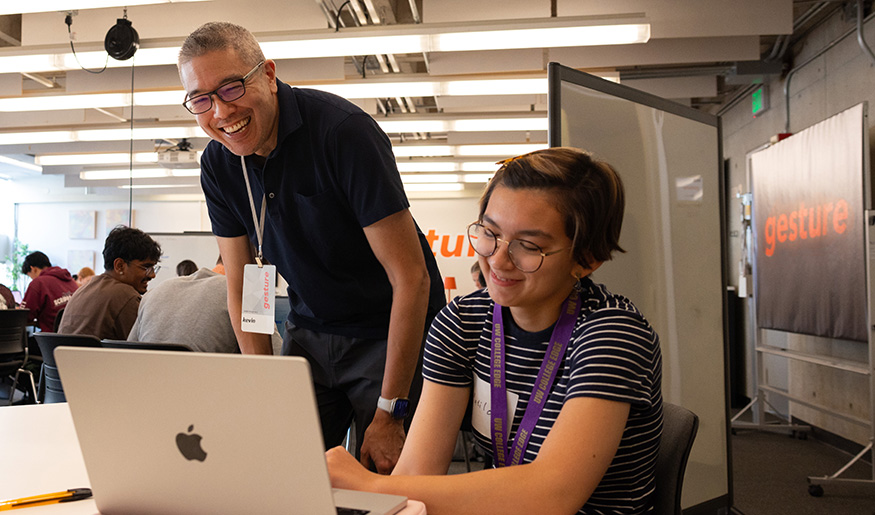
For college graduates, the transition from student to professional can be a challenge. In school, they complete assignments for grades. Faculty are explicit about expectations and provide guidance when students hit roadblocks. But when those students graduate and enter the workforce, they are expected to take more initiative and figure things out on their own.
They’re not always ready for the challenge.
To better prepare students for professional success, the UW College of Arts and Sciences (CAS) has introduced “gesture,” a mock startup company within the College, where student interns take on professional tasks, often fail at them, and receive honest feedback about how they can improve. Over time, the students take on more challenging, self-directed tasks. The program is offered through the College’s Center for 21st Century Liberal Learning (C21).
“Our goal is to produce graduates who are more like employees in their second or third job than employees in their first job,” says Kevin Mihata, CAS associate dean for undergraduate education and C21 director. “We want to do the professionalization training so employers don’t have to.”
Developing an Employee Mindset
The gesture program grew out of conversations that Mihata and his team had with employers in the Seattle area about student preparedness for the workforce. Employers were frank about the challenges of hiring graduates fresh out of school.
“They told us that college graduates were good at school-related things, like following explicit instructions, but when there were no clear directions, they consistently struggled with ambiguity,” says Mihata. “They were unable to be self-directed and sometimes almost offended when asked to do things differently from school.”
Our goal is to produce graduates who are more like employees in their second or third job than employees in their first job. We want to do the professionalization training so employers don’t have to.
With that feedback, the C21 team brainstormed how to strengthen students’ professional skills and prepare them for the shift from a student mindset to an employee mindset. They began offering workshops and internship bootcamps in 2017 and launched the gesture program in 2024.
Though gesture is a simulated startup, interns do work on actual projects as they would in an outside company. The startup produces employment-focused podcasts, videos, and social media posts, as well as workshops, courses, hackathons, and other career resources. The interns — about 24 each year — begin as generalists and later specialize in specific areas with additional responsibilities.
C21 staff serve as gesture’s leadership, holding titles like CEO, COO, and People & Culture Manager to familiarize students with common company hierarchies. Mihata, as CEO, meets with students individually to provide feedback on specific tasks. Often he must tell them they failed at a task, which is hard to hear but somewhat expected since gesture assignments are designed with a high likelihood of failure built in.
“Comfort is the enemy of growth,” Mihata explains. “Students usually focus on things they are really good at because that’s comfortable. But if you know you’re going to succeed, that’s not a challenge. To improve, you need to do some work you’re likely to fail at, get difficult feedback, and then grow to the next level. So in gesture, we purposely have them do things where they are as likely to fail as succeed, and we devote time to giving that difficult feedback. Spending that time is quite costly, and employers don’t have time to do that, so that is the transition we provide.”
Embracing AI
C21 also aims to increase students’ literacy about artificial intelligence. While gesture interns develop their professional identity, they also use various AI tools.
“Familiarity with AI is becoming a basic requirement in both technical and non-technical jobs,” says Mihata. “So our initial driver for this focus was that the job market is shifting that way. We have to understand what’s happening, or we won’t be able to prepare our students.”
Mihata notes that most students already have some familiarity with AI, but usually in a superficial way. As gesture interns, they must consider how AI impacts specific tasks in their work and then research which AI applications might be of use. Mihata hopes that C21 and the gesture program can partner with employers in the future, providing specific real-world problems for the students to work on.
“We want to produce the best early career AI generalists, so we need to know what types of problems they should be prepared to solve,” Mihata says. He adds that being located in the UW College of Arts & Sciences is a plus for the program.
“We’re changing how we prepare students,” he says, “but we are still embracing what traditionally have been the core philosophies of Arts and Sciences: communication, critical thinking, and the ability to define problems. All our work in gesture builds on those strengths.”
More Stories

AI in the Classroom? For Faculty, It's Complicated
Three College of Arts & Sciences professors discuss the impact of AI on their teaching and on student learning. The consensus? It’s complicated.

What Students Really Think about AI
Arts & Sciences weigh in on their own use of AI and what they see as the benefits and drawbacks of AI use in undergraduate education more broadly.

Bringing Music to Life Through Audio Engineering
UW School of Music alum Andrea Roberts, an audio engineer, has worked with recording artists in a wide range of genres — including Beyoncé.
